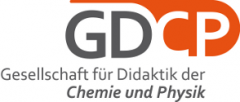Process Oriented Guided Inquiry Learning: Empirical evidence from student outcomes addressing the quality of instruction in chemistry
Treagust, David
Beitrag auf der GDCP-Jahrestagung 2017
Many research studies have investigated the nature and effectiveness of the quality of instruction for enhancing student achievement. A pedagogy directly addressing quality of instruction is Process Oriented Guided Inquiry Learning – POGIL – which refers to an instructional approach that uses group roles and highly structured activities in an instructor-facilitated non-lecture environment. Students master the content and develop essential process skills such as critical thinking, problem solving and communication. With assigned roles, three to four students work as small groups in large lecture theatres or workshops/tutorials where the instructors help them to actively discuss and explore the concepts from learning materials based on a learning cycle paradigm. Originally used in classes for first year undergraduate non-major chemistry students, POGIL has gained familiarity across other disciplines as an alternative pedagogical approach to traditional teaching and as a domain for scholarly activity. There are now many published POGIL-based studies, the majority in chemistry. In this talk, I will present a broad picture of the available research findings from POGIL studies in chemistry and describe results from a recent series of POGIL studies in chemistry in Perth, Australia and Doha, Qatar funded by the Qatar National Research Foundation.
Referenz:
Treagust, David (2018). Process Oriented Guided Inquiry Learning: Empirical evidence from student outcomes addressing the quality of instruction in chemistry. In: C. Maurer (Hrsg.), Qualitätsvoller Chemie- und Physikunterricht- normative und empirische Dimensionen. Gesellschaft für Didaktik der Chemie und Physik, Jahrestagung in Regensburg 2017. (S. 19). Universität Regensburg
Den Beitrag können Sie hier als pdf herunterladen.
Der gesamte Tagungsband, in dem dieser Beitrag erschienen ist, ist ebenfalls verfügbar: Tagungsband herunterladen
